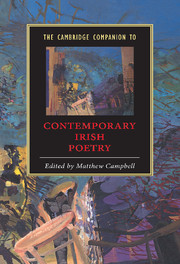Book contents
- Frontmatter
- 1 Ireland in poetry
- 2 From Irish mode to modernisation
- 3 Patrick Kavanagh and antipastoral
- 4 Louis MacNeice
- 5 The Irish modernists and their legacy
- 6 Poetry of the 1960s
- 7 Violence in Seamus Heaney's poetry
- 8 Mahon and Longley
- 9 Between two languages
- 10 Boland, McGuckian, Ni Chuilleanain and the body of the nation
- 11 Sonnets, centos and long lines
- 12 Performance and dissent
- 13 Irish poets and the world
- 14 Irish poetry into the twenty-first century
- Further reading
- Index
- Series List
11 - Sonnets, centos and long lines
Muldoon, Paulin, McGuckian and Carson
Published online by Cambridge University Press: 28 May 2006
- Frontmatter
- 1 Ireland in poetry
- 2 From Irish mode to modernisation
- 3 Patrick Kavanagh and antipastoral
- 4 Louis MacNeice
- 5 The Irish modernists and their legacy
- 6 Poetry of the 1960s
- 7 Violence in Seamus Heaney's poetry
- 8 Mahon and Longley
- 9 Between two languages
- 10 Boland, McGuckian, Ni Chuilleanain and the body of the nation
- 11 Sonnets, centos and long lines
- 12 Performance and dissent
- 13 Irish poets and the world
- 14 Irish poetry into the twenty-first century
- Further reading
- Index
- Series List
Summary
One way or another, it does seem that Irish writers again and again find
themselves challenged by the violent juxtaposition of the concepts of 'Ireland'
and T. Irish writers have a tendency to interpose themselves between the
two… either to bring them closer together, or to force them further apart. It's
as if they feel obliged to extend the notion of being a 'medium' to becoming a
'mediator'.
(Paul Muldoon, To Ireland, I, 2000)According to Paul Muldoon, Irish writers experience an often disabling tension between the urge to express private concerns in their work and the compulsion to address identity politics, inherited atavisms and the legacy of sectarian strife. His comments restate the competing definitions of what Seamus Heaney terms 'the government of the tongue'. This is an obligation to 'concede to the corrective pressures of social, moral, political and historical reality'. Yet it is also a liberating manifesto, allowing the poet to submit to 'the jurisdiction of achieved form', with poetry 'as its own vindicating force'. Heaney has consistently attempted to address these apparently conflictual imperatives. In Wintering Out and North, he engaged with what are euphemistically termed 'the Troubles' by advancing images of bodies drawn from the bogs at Tollund, Grauballe and Windeby as archaeological emblems of victimhood. This poetic reflex, whilst deep-felt and instinctive, was interpreted as providing decontextualised analogies (if not unintentional justifications) for the killings in Northern Ireland. Heaney had become, according to his fellow-poet Ciaran Carson, 'the laureate of violence - a mythmaker, an anthropologist of ritual killing, an apologist for “the situation”, in the last resort, a mystifier'.
- Type
- Chapter
- Information
- The Cambridge Companion to Contemporary Irish Poetry , pp. 189 - 208Publisher: Cambridge University PressPrint publication year: 2003
- 2
- Cited by



